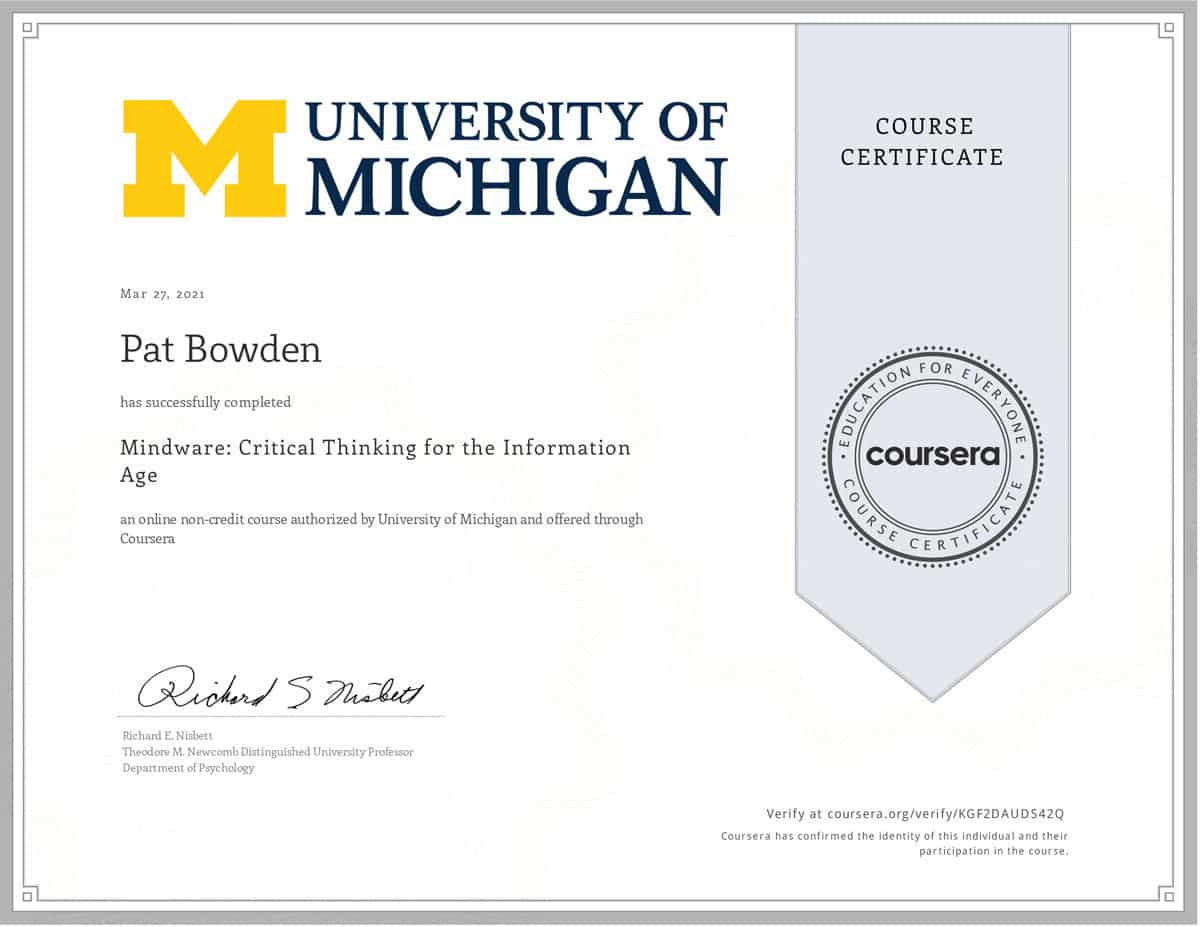The Study Group Attempts to Think Critically
How the internal Class Central Study Group learned to apply skills in a range of fields to improve decision making in everyday life

Here is our story of the sixth course taken by the private Study Group consisting of Class Central team members. By March 2021, the Study Group had grown to seven, but it was not always plain sailing. Some of us got stuck in Social Psychology, but we all earned free certificates in Sleep Deprivation: Habits, Solutions and Strategies.
Course Selection
This time, it was my turn to select 4 courses for our voting process. I was excited to explore Class Central’s constantly growing course catalog and chose four courses in different subjects. I manually selected courses with the highest rating (5 stars) and decent reviews, free to enroll, 4-5 weeks of length. After weighted voting by the team members, Mindware: Critical Thinking for the Information Age stood out.
Course Overview
The course is offered by the University of Michigan on Coursera and, more recently, on FutureLearn. It is free to join (including assessments on Coursera) and offers a paid certificate. Eight beginner level lessons are presented in a four-week format. Each lesson has video lectures, recommended reading materials, and a quiz.
Professor Richard Nisbett teaches us how to apply skills in statistics, probability, cognitive psychology, and cost-benefit theory to improve our decision making in everyday life. We are making decisions all the time but probably, we have not thought about how we made reasonings and if our reasonings are scientific.
The course touches a wide range of academic concepts in statistics and social psychology, including Normal distribution, Correlation, Law of Large Numbers, Confounded Variables, Statistical Significance, Fundamental Attribution Error, Confirmation Bias, etc.
The topic of this course is very similar to Social Psychology in introspection and reasoning. As with our learning experiences from Social Psychology, scientific concepts in psychology can be difficult to understand. But fortunately, Mindware: Critical Thinking for the Information Age is “light on definitions and heavy on examples”.
For example, when talking about correlation, the professor provides examples of some correlations in our life (a perfect correlation is 1.0). “The correlation with SAT scores with college GPA is about 0.4”, “the correlation between the heights of mothers and the heights of their daughters is about 0.5”, “the correlations between IQ and school performance, occupational attainment, and income are all about 0.4 to 0.5.” So, don’t worry too much if you don’t get high scores in SAT or IQ tests. A correlation of 0.5 is only around half the picture.
Course achievement

I was one of three team members who completed the course, including the assessments. @vishnu did the whole course on the phone, including all the quizzes. @pat got a certificate via her Coursera Plus subscription. Two others watched the videos, but did not attempt the quizzes.
Course review and reflection
This course for beginners provides basic information and simple examples about topics in critical thinking instead of going deeply.
From personal experience, critical thinking is the ability to think and judge independently and reflectively about what to do or not do, what to believe or not believe. This is important because we are living in the explosion of a new knowledge era driven by information and technology. That is to say, there is so much different information affecting our reasoning and decisions. And to optimise our thinking and decision-making, the ability to analyse information from diverse sources is essential.
In order to learn how to think critically beyond this course, I found some other resources in critical thinking:
Making Sense of News from The University of Hong Kong
Thinking Critically: Interpreting Randomized Clinical Trials from Stanford University
Thinking Critically Series: Interpreting Screening Trials from Stanford University
Sorting Truth From Fiction: Civic Online Reasoning from Massachusetts Institute of Technology
Critical Thinking: Fundamentals of Good Reasoning from IsraelX
Logical and Critical Thinking from The University of Auckland
Critical Thinking & Problem Solving from Rochester Institute of Technology
Philosophy and Critical Thinking from The University of Queensland
The Science of Everyday Thinking from The University of Queensland
Critical Thinking at University: An Introduction from University of Leeds
Effective Problem-Solving and Decision-Making from University of California, Irvine
Critical thinking: reasoned decision making from Tecnológico de Monterrey
Thinking Complexity from Toulouse Business School
Your Deceptive Mind: A Scientific Guide to Critical Thinking Skills from The Great Courses Plus
Critical Thinking Skills for University Success from The University of Sydney
Teaching Critical Thinking through Art with the National Gallery of Art from SmithsonianX
PHIL102: Introduction to Critical Thinking and Logic from Saylor.org Academy
Critical thinking web from The University of Hong Kong
Critical Reasoning for Beginners from University of Oxford
Critical Thinking Classes Spring 2011 from Fayetteville State University
Tags






